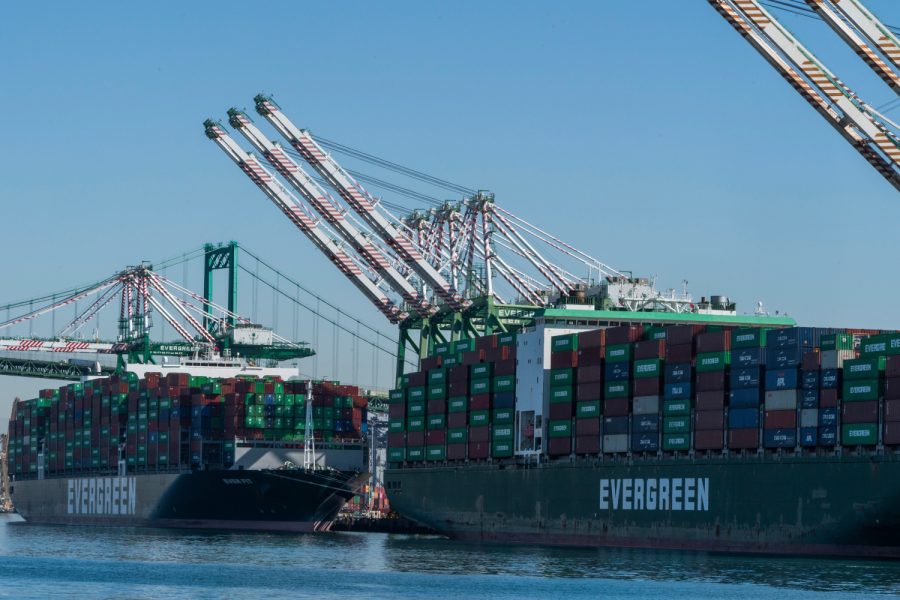Opinion | The US needs supply chain legislation
Congress should pursue legislation to alleviate global supply chain disruptions.
Robert Hanashiro / USA TODAY NET
Oct 16, 2021; San Pedro, Calif., USA; Cargo ships wait to be off loaded at the Port of Los Angeles. Supply chain issues have caused shortages of goods throughout the country with cargo ships waiting off shore in Southern California to off-load. Credit: Robert Hanashiro, USA TODAY.
November 30, 2021
“I apologize, but we are still out of straws. Is that okay?” I said during a morning shift at Panera Bread.
“Oh, that’s fine. When will you get straws again?” the customer asked, posing the same question I’ve heard multiple times a day for more than a month.
“Honestly, with the supply chain issues right now, we’re not quite sure,” I said, assuring the customer that the issue is beyond the control of food service employees.
Panera Bread isn’t the only company experiencing shortages, nor is the problem isolated in the foodservice industry. Shortages are widespread across multiple industries in the U.S. and globally.
For consumers, there’s little recourse of action to solve these issues, other than lowering their own personal demand. It’s time for the federal government to intervene and pass legislation aimed at alleviating our supply chain issues.
Coupled with increasing demand and a workforce shortage, the fallout from the COVID-19 pandemic created global supply chain bottlenecks. Consumers and workers alike have felt the effects for months, missing items as trivial as straws to significant products like food, cars, and electronics.
In Iowa, our politicians have recognized the supply chain backlogs as a major issue in need of a resolution. Rep. Cindy Axne of Iowa’s 3rd Congressional District announced her supply chain solutions agenda in November, prioritizing work on legislation to solve supply chain shortages for Iowans.
Axne’s supply chain solutions agenda includes four pieces of legislation, and some of these bills have support from other members of Iowa’s House delegation as well. After I interned in Axne’s office, it was clear to me that she prioritizes the issues most important to Iowans.
The first piece of legislation in this plan is the Ocean Shipping Reform Act, co-sponsored by all four of Iowa’s representatives. This bill is oriented toward addressing port congestion, one of the most prominent factors contributing to the supply chain backlog. Addressing this issue would relieve a great deal of disruptions at this point in the supply chain.
The second piece of legislation on Axne’s agenda is called the Developing Responsible Individuals for a Vibrant Economy (DRIVE) Act. To address the driver shortage, this bill would establish a program through the U.S. Department of Transportation to train younger truckers.
Current federal law bans people under the age of 21 from moving goods across state lines, but passing this bill would lower that age requirement to 18. The creation of an apprenticeship program for truckers would not only alleviate supply chain issues, but also create job opportunities for younger folks. Reps. Randy Feenstra, Ashley Hinson, and Axne are co-sponsors of the bill.
Third on Axne’s list is the Manufacturing American Dynamism in Entrepreneurship and Harnessing Education to Retool Employees (MADE HERE) Act. According to Axne’s agenda, this bill would combine resources from educational institutions, private companies, nonprofits, labor groups, and the government to combat manufacturing issues. Under multiple governmental organizations, a program would be established to dole out funding and grants for eligible groups.
The Critical Supply Chains Commissions Act is the fourth piece of legislation on Axne’s agenda, and this bill is necessary to prevent supply chain backlogs in the future. By establishing a nonpartisan commission to study our supply chain and prevent future obstructions, Congress will be prepared to combat current issues in the future.
Many experts anticipate that global supply chain issues are here to stay, at least for a while. Congress must continue to prioritize combating fallout from the pandemic, including the quest to find supply chain solutions.
In the meantime, consumers should continue to be gracious with workers at their local restaurants and stores. After all, this is a global issue impacting all of us.
Columns reflect the opinions of the authors and are not necessarily those of the Editorial Board, The Daily Iowan, or other organizations in which the author may be involved.














